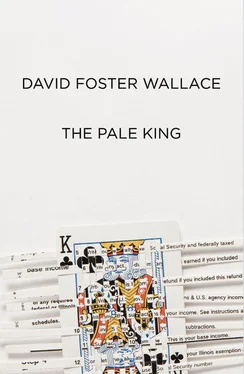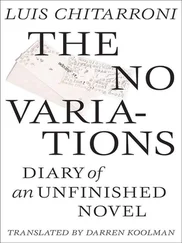Anyhow, as mentioned, a crucial element in my entering the Service was ending up in the wrong but identical classroom at DePaul in December 1978, which I was so immersed in staying focused for the Federalist Papers review that I didn’t even notice my error until the prof walked in. I couldn’t tell whether he was the real fearful Jesuit or not. I only later found out that he wasn’t the Advanced Tax instructor of record — there had evidently been some sort of personal emergency for the course’s regular Jesuit prof, and this one had taken over as a sub for the last two weeks. Hence the initial confusion. I remember thinking that, for a Jesuit, the prof was in definite ‘mufti.’ He wore an archaically conservative dark-gray suit whose boxy look might have been actual flannel, and his dress shoes’ shine was dazzling when the classroom’s overhead fluorescents hit them at the proper angle. He seemed lithe and precise; his movements had the brisk economy of a man who knows time is a valuable asset. In terms of realizing my mistake, this was also when I stopped mentally reviewing the Federalist and became aware of a markedly different vibe among the students in this classroom. Several wore neckties under sweater vests, a couple of these vests being actual argyle. Every last shoe I could see was a black or brown leather business shoe, their laces neatly tied. To this day, I do not know precisely how I took the wrong building’s door. I am not the sort of person who gets lost easily, and I knew Garnier Hall, as it’s where the Intro Accounting class also met. Anyhow, to reiterate, on this day I had somehow gone to 311 Garnier Hall, instead of my own political science class’s identical 311 Daniel Hall directly across the transom, and had sat down along the side wall near the room’s extreme rear, a spot from which, once I came out of my preoccupation and realized my error, I would have had to cause a lot of disruption and moving of book bags and down jackets in order to get out — the room was completely filled by the time the substitute came in. Later, I learned that a few of the room’s most obviously serious and adult-looking students, with actual briefcases and accordion files instead of backpacks, were graduate students in DePaul’s advanced-degree business program — the Advanced Tax course was that advanced. Actually, DePaul’s whole accounting department was very serious and strong — accounting and business administration were institutional strengths that DePaul was known for and spent a good deal of time extolling in its brochures and promotional materials. Obviously, this isn’t why I had reenrolled at DePaul — I had next to no interest in accounting except, as mentioned, to prove something or compensate my father by finally passing Intro. The school’s accounting program turned out to be so high-powered and respected, though, that nearly half of that classroom’s Advanced Tax students were already signed up to take the February 1979 CPA exam, although at that time I barely knew what this licensing exam even was, or that it took several months of study and practice to prepare for. For instance, I learned later that the final exam in Advanced Tax was actually designed to be a microcosm of some of the taxation sections of the CPA exam. My father, by the way, also held a CPA license, though he rarely used it in his job with the city. In hindsight, though, and in the light of all that eventuated from that day, I’m not even sure I would have walked out even if the logistics of leaving hadn’t been so awkward — not once the substitute came in. Even though I really did need that final-exam review in American Political Thought, I still may have stayed. I’m not sure I can explain it. I remember he came briskly in and hung his topcoat and hat on a hook on the corner’s flag-stand. To this day, I can never be totally sure whether bumbling into the wrong building’s 311 right before final exams might not just have been one more bit of unconscious irresponsibility on my part. You cannot analyze sudden, dramatic experiences like this this way, though — especially in hindsight, which is notoriously tricky (though I obviously did not understand this during the exchange with the Christian girl in the boots).
At the time, I did not know how old the substitute was — as mentioned, I only learned later that he was filling in for the class’s real Jesuit father, whose absence seemed unmourned — or even his name. My main experience with substitutes had been in high school. In terms of age, all I knew was that he was in that amorphous (to me) area between forty and sixty. I don’t know how to describe him, though he made an immediate impression. He was slender, and in the room’s bright lighting he looked pale in a way that seemed luminous instead of sickly, and had a steel-colored crew cut and a sort of pronounced facial bone structure. Overall, he looked to me like someone in an archaic photo or daguerreotype. His business suit’s trousers were double pleated, which added to the impression of box-like solidity. Also, he had good posture, which my father always referred to as a person’s ‘carriage’ —upright and square-shouldered without seeming stiff — and as he came briskly in with his accordion file filled with neatly organized and labeled course materials, all of the room’s accounting students seemed unconsciously to shift and sit up a little straighter at their little desks. He pulled down the A/V screen before the board much as one would pull down a window’s shade, using his pocket handkerchief to touch the screen’s handle. To the best of my recollection, nearly everyone in the room was male. A handful were also oriental. He was getting his materials out and arranging them, looking down at his desktop with a little formal smile. What he was actually doing was the teacherly thing of acknowledging the roomful of students without looking at them. They in turn were totally focused, to a man. The whole room was different from political science or psychology classes, or even Intro Accounting, where there was always litter on the floor and people slouched back on their tailbones in their seats and looked openly up at the clock or yawned, and there was always a constant restless, whispery undertone which the Intro Accounting professor pretended wasn’t there — maybe the normal profs no longer even heard the sound, or were immune to students’ open displays of tedium and inattention. When the substitute accounting professor entered, however, this room’s whole voltage changed. I don’t know how to describe it. Nor can I totally rationally explain why I stayed — which, as mentioned, meant missing the final review in American Political Thought. At the time, continuing to sit there in the wrong class seemed like just one more feckless, undisciplined impulse. Maybe I was embarrassed to have the sub see me leave. Unlike the Christian girlfriend, I never seem to recognize important moments at the time they’re going on — they always seem like distractions from what I’m really supposed to be doing. One way to explain it is that there was just something about him — the substitute. His expression had the same burnt, hollow concentration of photos of military veterans who’d been in some kind of real war, meaning combat. His eyes held us whole, as a group. I know I suddenly felt uncomfortable about my painter’s pants and untied Timberlands, but if the substitute reacted to them one way or the other, he gave no sign. When he signified the official start of class by looking at his watch, it was with a crisp gesture of bringing his wrist sharply out and around, like a boxer’s left cross, the force pulling up the sleeve of his suit jacket slightly to disclose a stainless steel Piaget, which I remember at the time struck me as a surprisingly racy watch for a Jesuit.
Читать дальше












